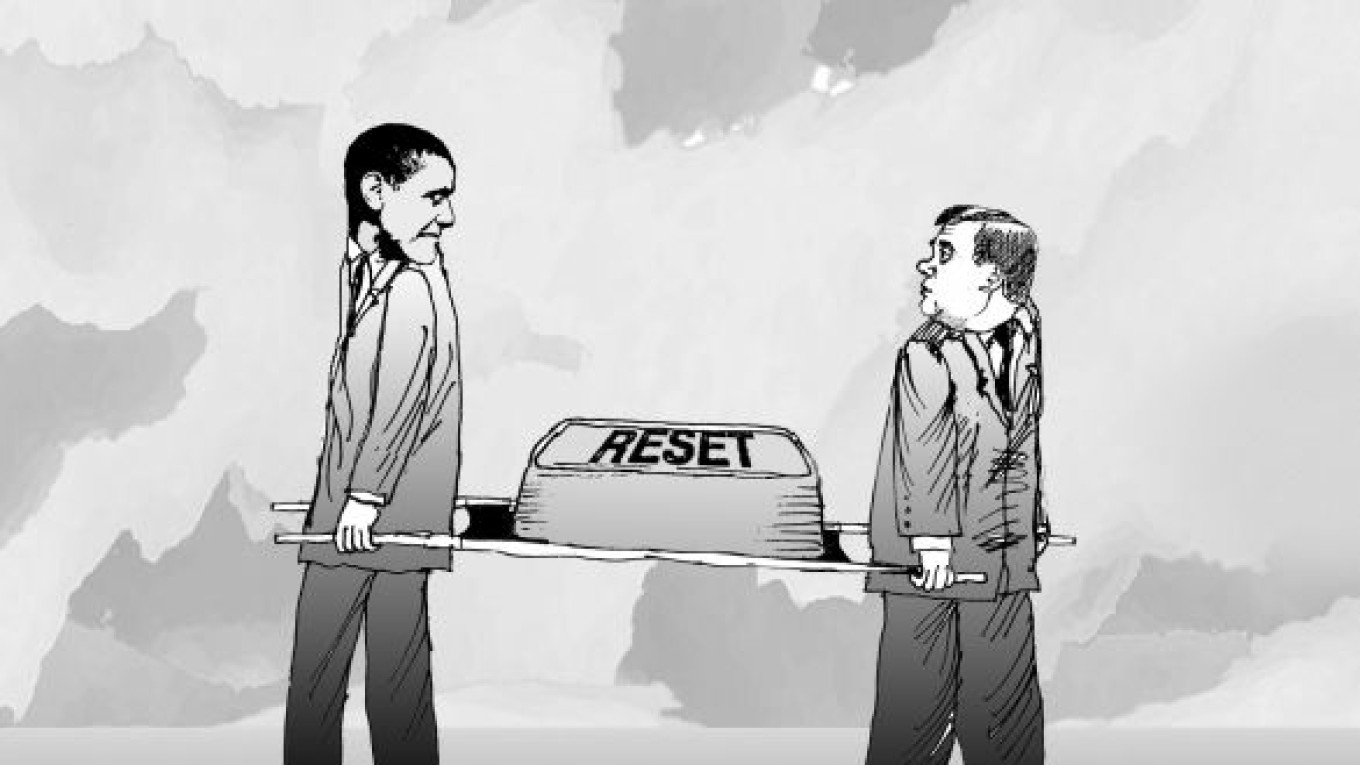A year ago at the 2009 Munich security conference, U.S. Vice President Joe Biden pronounced his now-famous “reset” speech. He signaled the high hopes that the administration of President Barack Obama had for improving U.S.-Russian relations after they reached a low point in the wake of the August 2008 war with Georgia.
The U.S. National Security Council conducted a formal review of its Russia policy, and it is worth noting that of the four top foreign speeches that Obama delivered in 2009 — in Cairo, Prague, Moscow and New York to the United Nations — only his July 7 address to students at the New Economic School in Moscow was devoted to a single country. A bilateral presidential commission was created under the leadership of Secretary of State Hillary Clinton and Foreign Minister Sergei Lavrov with a dozen working groups.
But the momentum of those early months soon dissipated. The most tangible result of the new policy of constructive engagement was Russian approval of land transit for U.S. supplies into Afghanistan, providing a cost-saving and strategically valuable alternative to passage through Pakistan. Moscow also agreed to allow flights carrying lethal materials — including troops — through Russian airspace, though negotiations over the protocols for such flights have delayed implementation for several months. President Dmitry Medvedev also showed new flexibility with regard to possible sanctions on Iran. Russia’s patience with Iran was strained when Tehran rejected Moscow’s offer to reprocess fuel for a research reactor and when U.S. Defense Secretary Robert Gates announced that the Iranians had concealed from the International Atomic Energy Agency a secret uranium enrichment facility that they built near Qom.
But, unfortunately, that is where the U.S.-Russian reset has ended. Despite both sides’ commitment to renew the START treaty that expired Dec. 5, negotiations over the finer points of warhead storage and telemetry encryption have dragged on. U.S. efforts to accelerate Russia’s entry to the World Trade Organization were torpedoed in June, when Prime Minister Vladimir Putin blithely stated that Russia was withdrawing its individual membership application.
Why did the hopes for a fresh start fail to materialize, despite the attention that Obama and Clinton devoted to the issue?
The poor relations were not simply a product of the mismanagement of the administration of former U.S. President George W. Bush, a situation that could be fixed with a burst of diplomacy. One big problem for the United States: It still cannot decide whether Russia is a potential friend or a future foe. The two sides also differ over how to interpret their past relations. For example, it was not clear what date the reset button was set for — surely, not the final year of the administration of U.S. President Bill Clinton. In 2000, thanks to the Kosovo war, U.S.-Russian relations were perhaps at their lowest point since 1985.
The main reason for the misfire revolves around the fundamental differences between the strategic perspectives of Moscow and Washington. Neither side wants to acknowledge these differences since it would involve each recognizing the limits of their respective powers. The United States refuses to grant Russia what Medvedev rather bluntly called its “zone of privileged interests” in the post-Soviet states. Russia, for its part, will not accept U.S. military bases or support for color revolutions in Russia’s backyard. Moscow was apoplectic at the idea of U.S. missile defense systems in Poland and the Czech Republic, a plan that the Obama administration finally dropped in September. (To be sure, that decision was not a sop to the Russians, but reflected a reassessment of the nature of the Iranian missile threat.) Absent some concessions on these crucial issues, there will be no serious thaw in relations.
Another drawback to the U.S. approach was a willingness to see Medvedev as a latter-day Mikhail Gorbachev, a progressive thinker and reformer who was held back by the Communist reactionaries in the Politburo. This canard was recycled in the latest annual threat assessment, which National Intelligence Director Denis Blair presented to the Senate Foreign Relations Committee on Feb. 2. Blair argued that Medvedev’s modernization agenda “faces formidable opposition from within the entrenched elite,” controlled by Putin.
In today’s complex and interdependent world, it is neither logical nor practical to try to nurture a special bilateral relationship outside of the general web of multilateral diplomatic initiatives. U.S. foreign policy is fragmented into a number of distinct domains — financial stabilization, nuclear proliferation, Islamic terrorism, climate change, etc. Russia’s position on many of these issues is at best unclear — and at worst contrary to U.S. interests. A policy of constructive disengagement may stand more chance of long-term success.
Peter Rutland is a professor of government at Wesleyan University in Middletown, Connecticut and an associate of the Davis Center for Russian and Eurasian Studies at Harvard University.
A Message from The Moscow Times:
Dear readers,
We are facing unprecedented challenges. Russia's Prosecutor General's Office has designated The Moscow Times as an "undesirable" organization, criminalizing our work and putting our staff at risk of prosecution. This follows our earlier unjust labeling as a "foreign agent."
These actions are direct attempts to silence independent journalism in Russia. The authorities claim our work "discredits the decisions of the Russian leadership." We see things differently: we strive to provide accurate, unbiased reporting on Russia.
We, the journalists of The Moscow Times, refuse to be silenced. But to continue our work, we need your help.
Your support, no matter how small, makes a world of difference. If you can, please support us monthly starting from just $2. It's quick to set up, and every contribution makes a significant impact.
By supporting The Moscow Times, you're defending open, independent journalism in the face of repression. Thank you for standing with us.
Remind me later.


